| Listing 1 - 10 of 33 | << page >> |
Sort by
|
Book
ISBN: 2130483992 9782130483991 Year: 1997 Volume: 571 Publisher: Paris: PUF,
Abstract | Keywords | Export | Availability | Bookmark
 Loading...
Loading...Choose an application
- Reference Manager
- EndNote
- RefWorks (Direct export to RefWorks)
Numbers, Prime. --- Numbers, Prime --- Prime numbers --- Numbers, Natural --- Nombres premiers
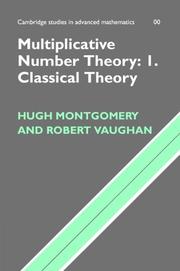
ISBN: 9780521849036 0521849039 9780511618314 9781107405820 9780511256455 0511256450 051161831X 1107405823 110716477X 1280709979 9786610709977 0511256965 0511257465 0511255888 0511319584 Year: 2007 Volume: 97 Publisher: Cambridge : Cambridge University Press,
Abstract | Keywords | Export | Availability | Bookmark
 Loading...
Loading...Choose an application
- Reference Manager
- EndNote
- RefWorks (Direct export to RefWorks)
Prime numbers are the multiplicative building blocks of natural numbers. Understanding their overall influence and especially their distribution gives rise to central questions in mathematics and physics. In particular their finer distribution is closely connected with the Riemann hypothesis, the most important unsolved problem in the mathematical world. Assuming only subjects covered in a standard degree in mathematics, the authors comprehensively cover all the topics met in first courses on multiplicative number theory and the distribution of prime numbers. They bring their extensive and distinguished research expertise to bear in preparing the student for intelligent reading of the more advanced research literature. This 2006 text, which is based on courses taught successfully over many years at Michigan, Imperial College and Pennsylvania State, is enriched by comprehensive historical notes and references as well as over 500 exercises.
Numbers, Prime. --- Number theory. --- Number study --- Numbers, Theory of --- Algebra --- Prime numbers --- Numbers, Natural
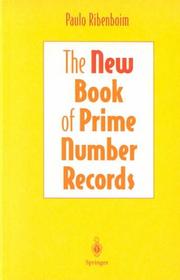
ISBN: 0387944575 1461268923 1461207592 9780387944579 Year: 1996 Publisher: New York (N.Y.): Springer,
Abstract | Keywords | Export | Availability | Bookmark
 Loading...
Loading...Choose an application
- Reference Manager
- EndNote
- RefWorks (Direct export to RefWorks)
Numbers, Prime --- 511.213 --- 511.213 Elementary prime number theory --- Elementary prime number theory --- Prime numbers --- Numbers, Natural --- Number theory
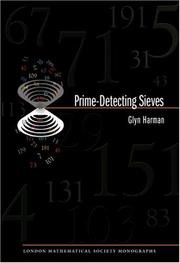
ISBN: 1283848295 1400845939 9781400845934 9780691124377 069112437X 9781283848299 0691202990 9780691202990 Year: 2007 Publisher: Princeton : Princeton University Press,
Abstract | Keywords | Export | Availability | Bookmark
 Loading...
Loading...Choose an application
- Reference Manager
- EndNote
- RefWorks (Direct export to RefWorks)
This book seeks to describe the rapid development in recent decades of sieve methods able to detect prime numbers. The subject began with Eratosthenes in antiquity, took on new shape with Legendre's form of the sieve, was substantially reworked by Ivan M. Vinogradov and Yuri V. Linnik, but came into its own with Robert C. Vaughan and important contributions from others, notably Roger Heath-Brown and Henryk Iwaniec. Prime-Detecting Sieves breaks new ground by bringing together several different types of problems that have been tackled with modern sieve methods and by discussing the ideas common to each, in particular the use of Type I and Type II information. No other book has undertaken such a systematic treatment of prime-detecting sieves. Among the many topics Glyn Harman covers are primes in short intervals, the greatest prime factor of the sequence of shifted primes, Goldbach numbers in short intervals, the distribution of Gaussian primes, and the recent work of John Friedlander and Iwaniec on primes that are a sum of a square and a fourth power, and Heath-Brown's work on primes represented as a cube plus twice a cube. This book contains much that is accessible to beginning graduate students, yet also provides insights that will benefit established researchers.
Sieves (Mathematics) --- Numbers, Prime. --- Number theory. --- Number study --- Numbers, Theory of --- Algebra --- Prime numbers --- Numbers, Natural --- Number sieves --- Number theory
Book
ISBN: 2705613668 9782705613662 Year: 1975 Volume: 1366 9 Publisher: Paris: Hermann,
Abstract | Keywords | Export | Availability | Bookmark
 Loading...
Loading...Choose an application
- Reference Manager
- EndNote
- RefWorks (Direct export to RefWorks)
Number theory --- Numbers, Prime --- Nombres premiers --- 511.345 --- 511.213 --- 511.333 --- Prime numbers --- Numbers, Natural --- Additive problems with prime numbers --- Elementary prime number theory --- Distribution of primes and divisors in number fields --- 511.333 Distribution of primes and divisors in number fields --- 511.213 Elementary prime number theory --- 511.345 Additive problems with prime numbers --- Nombres, Théories des --- Fonctions speciales --- Fonctions zeta
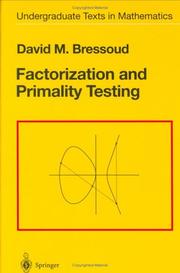
ISBN: 0387970401 1461288711 1461245443 9780387970400 Year: 1989 Publisher: New York (N.Y.): Springer,
Abstract | Keywords | Export | Availability | Bookmark
 Loading...
Loading...Choose an application
- Reference Manager
- EndNote
- RefWorks (Direct export to RefWorks)
Factorization (Mathematics) --- Numbers, Prime --- Factorisation --- Nombres premiers --- 511.1 --- #TELE:d.d. Prof. R. Govaerts --- Prime numbers --- Numbers, Natural --- Mathematics --- Elementary arithmetic --- 511.1 Elementary arithmetic
Book
ISBN: 3319567624 3319567616 Year: 2017 Publisher: Cham : Springer International Publishing : Imprint: Springer,
Abstract | Keywords | Export | Availability | Bookmark
 Loading...
Loading...Choose an application
- Reference Manager
- EndNote
- RefWorks (Direct export to RefWorks)
With a specific focus on the mathematical life in small undergraduate colleges, this book presents a variety of elementary number theory insights involving sequences largely built from prime numbers and contingent number-theoretic functions. Chapters include new mathematical ideas and open problems, some of which are proved in the text. Vector valued MGPF sequences, extensions of Conway’s Subprime Fibonacci sequences, and linear complexity of bit streams derived from GPF sequences are among the topics covered in this book. This book is perfect for the pure-mathematics-minded educator in a small undergraduate college as well as graduate students and advanced undergraduate students looking for a significant high-impact learning experience in mathematics.
Mathematics. --- Number theory. --- Number Theory. --- Number study --- Numbers, Theory of --- Algebra --- Numbers, Prime. --- Sequences (Mathematics) --- Mathematical sequences --- Numerical sequences --- Mathematics --- Prime numbers --- Numbers, Natural --- Math --- Science
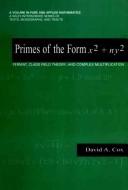
ISBN: 0471506540 9780471506546 Year: 1989 Publisher: New York (N.Y.): Wiley,
Abstract | Keywords | Export | Availability | Bookmark
 Loading...
Loading...Choose an application
- Reference Manager
- EndNote
- RefWorks (Direct export to RefWorks)
Numbers, Prime --- #WBIB:dd.Lic.L.De Busschere --- 511.6 --- 511.6 Algebraic number fields --- Algebraic number fields --- Prime numbers --- Numbers, Natural
Book
ISBN: 3110730529 9783110730524 3110735261 9783110735260 Year: 2021 Publisher: Berlin ; Boston : De Gruyter.
Abstract | Keywords | Export | Availability | Bookmark
 Loading...
Loading...Choose an application
- Reference Manager
- EndNote
- RefWorks (Direct export to RefWorks)
Nikomachos von Geresa (2. Jh. n. Chr.) schuf mit seiner Einführung in die Arithmetik ein gut verständliches und wirkungsmächtiges Lehrwerk. Behandelt werden die Primzahlen und Zahlen aller anderen Art, die Relation von Zahlen, aber auch Quadrat und Kubikzahlen und Mittelwerte. Nikomachos stellte die antike Zahlentheorie übersichtlich dar und wurde so zu einer Schlüsselfigur für die spätere Mathematik.
LITERARY CRITICISM / Ancient & Classical. --- Ancient Sciences. --- Eratosthenes' Sieve. --- History of Mathematics. --- Pythagoras. --- Theory of Numbers. --- prime numbers. --- LITERARY CRITICISM / Ancient & Classical --- E-books --- Arithmétique --- Mathématiques --- Philosophie
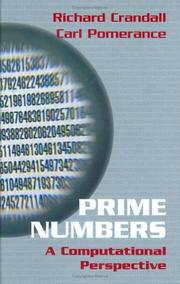
ISBN: 0387947779 1468493183 1468493167 Year: 2000 Publisher: New York (N.Y.) : Springer,
Abstract | Keywords | Export | Availability | Bookmark
 Loading...
Loading...Choose an application
- Reference Manager
- EndNote
- RefWorks (Direct export to RefWorks)
In this volume we have endeavored to provide a middle ground-hopefully even a bridge-between "theory" and "experiment" in the matter of prime numbers. Of course, we speak of number theory and computer experiment. There are great books on the abstract properties of prime numbers. Each of us working in the field enjoys his or her favorite classics. But the experimental side is relatively new. Even though it can be forcefully put that computer science is by no means young, as there have arguably been four or five computer "revolutions" by now, it is the case that the theoretical underpinnings of prime numbers go back centuries, even millennia. So, we believe that there is room for treatises based on the celebrated classical ideas, yet authored from a modern computational perspective. Design and scope of this book The book combines the essentially complementary areas of expertise of the two authors. (One author (RC) is more the computationalist, the other (CP) more the theorist. ) The opening chapters are in a theoretical vein, even though some explicit algorithms are laid out therein, while heavier algorithmic concentration is evident as the reader moves well into the book. Whether in theoretical or computational writing mode, we have tried to provide the most up-to-date aspects of prime-number study. What we do not do is sound the very bottom of every aspect.
Numbers, Prime. --- Numbers, Prime --- 511.3 --- Prime numbers --- Numbers, Natural --- 511.3 Analytical, additive and other number-theory problems. Diophantine approximations --- Analytical, additive and other number-theory problems. Diophantine approximations --- Number theory. --- Number Theory. --- Number study --- Numbers, Theory of --- Algebra
| Listing 1 - 10 of 33 | << page >> |
Sort by
|

 Search
Search Feedback
Feedback About UniCat
About UniCat  Help
Help News
News